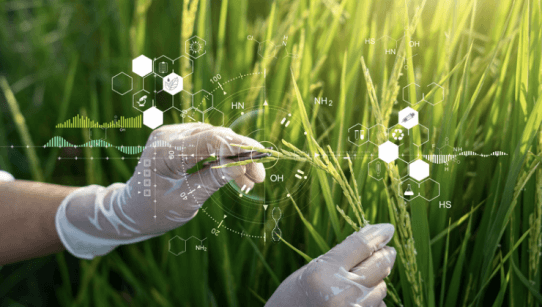The application of Agricultural genomics to feed the expanding population in the future
Food Security and nutrition has always been one of the ultimate issues concerning human health and development in the world. Although some developed countries have sufficient food supply, many people do not have reliable access to plentiful, nutritious food: nearly 193 million people in 53 nations will experience acute food insecurity in 2022. [1] The global food crisis is becoming even more acute. That was the year, that the global epidemic was an even greater challenge to poor nutrition and health condition and leave millions of people below the global subsistence baseline.

Although the current state of global food security and health, is on top of the projected needs of a growing global population, the future picture is not as bleak as it may seem.
Agrigenomics is already boosting sustainable productivity and offering answers to the expanding problems associated with feeding the world’s population. [2] Agrigenomics tools enable plant breeders, researchers, and farmers to guide breeding and planting decisions by rapidly creating and/or identifying genetic markers linked to desirable phenotypic features such as increased crop yield or drought resistance. Advances in high-throughput sequencing, genome assembly methods, and genomic, metagenomic, and transcriptomic analysis enable breeders to simultaneously interrogate crop genomes for genes and alleles associated with multiple traits of interest, such as grain yield, end-use traits, nitrogen-use efficiency (NUE), flowering time, early heading, seed development, biotic and abiotic stress response, and disease-resistance, to name a few. [1-4]
Advanced biotechnology to improve productivity, sustainability, adaptability
Crop production must be increased in the future to feed the world’s growing population, and crop breeders often use genetic variants to enhance crop yield and quality. Yun et al. (2021) used a feasible strategy to exploit the genomic variations of Aegilops tauschii via introgression. They developed a quick introgression platform for transmitting A. tauschii’s overall genetic variants to elite wheat, thus enriching the wheat germplasm pool. The high-quality reference genomes of A. tauschii, as well as the genomic variation landscape of A. tauschii and the A-WSOW pool, are valuable resources for facilitating gene discovery and breeding in wheat, ultimately boosting crop production and quality. [5]
An important aspect of food production in the future will be improving crops’ NUE to ensure sustainability. NUE is an important consideration for environmentally friendly, sustainable agriculture because nitrogen (N) is a key limiting factor in crop production. [1,3]While increased use of N fertilizers has the positive effect of increasing yield, it also leads to environmental damage from nitrogen runoff. High-NUE crops are desirable because they are more tolerant of N deficiency in soil and require less fertilizer. A 2022 study by Shi et al. illustrates the power of genomic applications to generate novel insights into the molecular mechanisms driving NUE. By generating a genome assembly and performing transcriptomic analyses of the high-NUE Chinese wheat cultivar Kenong 9204, they identified expansions in gene families associated with N uptake and metabolism.[3] These discoveries will enable breeders to select high-NUE traits in future wheat cultivars, and perhaps also in other crops to reduce the need for N fertilizer.

Another important factor for future food production is adaptability to environmental changes. Genomic analyses and comparisons can identify the history of adaptation; plants carry in their genomes. Thus, taking a historical view can provide new information on how plants have adapted to new climates or environmental conditions as they have spread geographically. In a 2022 study, Li et al. used de novo sequencing to analyze genomic variation among wild and cultivated soybeans. Their goal was to identify environmental adaptations and gene flow as soybean cultivation developed and spread through East Asia. They identified introgressions from wild populations into subpopulations of cultivated soybeans as important sources of genetic diversity and locally adapted alleles. Their result also indicated that loci regulating flowering time have undergone selection during soybean domestication and geographic spread, suggesting that flowering time has had a significant role in soybean adaptation to different environments.[4]
As these examples illustrate, genomic applications and biotechnology tools provide a path forward to producing crop varieties that will enhance local, national, and regional food security. Utilizing genomic variability provides an opportunity for increased crop productivity and quality; Crop varieties capable of using nutrients more effectively will need less fertilizer, and varieties that are adapted to (or can adapt to) changing conditions will be more resilient. Eventually, the goals of these and other agrigenomic developments are to sustainably produce more food in the face of environmental change challenges.
Reference
1. Global Network Against Food Crises. 2022. Global Report on Food Crises 2022.
2. Illumina. Agrigenomics Research Review. (2019) https://www.illumina.com/content/dam/illumina-marketing/documents/products/research_reviews/agrigenomics-research-review.pdf Accessed October 12, 2022.
3. Xiao J. et al. (2022) Wheat genomic study for genetic improvement of traits in China. Sci. China Life Sci 65: 1718.
4. Li Y-H. et al. (2022) Genome-wide signatures of the geographical expansion and breeding of soybean. Sci. China Life Sci 65: doi.org/10.1007/s11427-022-2158-7.
5. Zhou, Y., Bai, S., Li, H. et al. Introgressing the Aegilops tauschii genome into wheat as a basis for cereal improvement. Nat. Plants 7, 774–786 (2021).
6. FAO. 2016. Meeting Report. Application of genome sequencing for sustainable agriculture and food security. Side event of the 25th session of the Committee on Agriculture (COAG).
